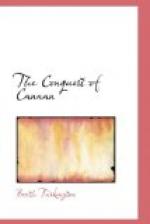“Just as you say, Joe,” a breaking voice came back from the foot of the steps,—“just as you say!”
The lawyer turned from the landing and went rapidly to the window beside Ariel. Together they watched the shabby little figure cross the street below; and she felt an infinite pathos gathering about it as it paused for a moment, hesitating, underneath the arc-lamp at the corner. They saw the white face lifted as Happy Fear gave one last look about him; then he set his shoulders sturdily, and steadfastly entered the door of the jail.
Joe took a deep breath. “Now we’ll go,” he said. “I must be quick.”
“What was it?” she asked, tremulously, as they reached the street. “Can you tell me?”
“Nothing—just an old story.”
He had not offered her his arm, but walked on hurriedly, a pace ahead of her, though she came as rapidly as she could. She put her hand rather timidly on his sleeve, and without need of more words from her he understood her insistence.
“That was the husband of the woman who told you her story,” he said. “Perhaps it would shock you less if I tell you now than if you heard it to-morrow, as you will. He’s just shot the other man.”
“Killed him!” she gasped.
“Yes,” he answered. “He wanted to run away, but I wouldn’t let him. He has my word that I’ll clear him, and I made him give himself up.”
XVI
THE TWO CANAANS
When Joe left Ariel at Judge Pike’s gate she lingered there, her elbows upon the uppermost cross-bar, like a village girl at twilight, watching his thin figure vanish into the heavy shadow of the maples, then emerge momentarily, ghost-gray and rapid, at the lighted crossing down the street, to disappear again under the trees beyond, followed a second later by a brownish streak as the mongrel heeled after him. When they had passed the second corner she could no longer be certain of them, although the street was straight, with flat, draughtsmanlike Western directness: both figures and Joe’s quick footsteps merging with the night. Still she did not turn to go; did not alter her position, nor cease to gaze down the dim street. Few lights shone; almost all the windows of the houses were darkened, and, save for the summer murmurs, the faint creak of upper branches, and the infinitesimal voices of insects in the grass, there was silence: the pleasant and somnolent hush, swathed in which that part of Canaan crosses to the far side of the eleventh hour.
But Ariel, not soothed by this balm, sought beyond it, to see that unquiet Canaan whither her old friend bent his steps and found his labor and his dwelling: that other Canaan where peace did not fall comfortably with the coming of night; a place as alien in habit, in thought, and almost in speech as if it had been upon another continent. And yet—so strange is the duality of towns—it lay but a few blocks distant.




